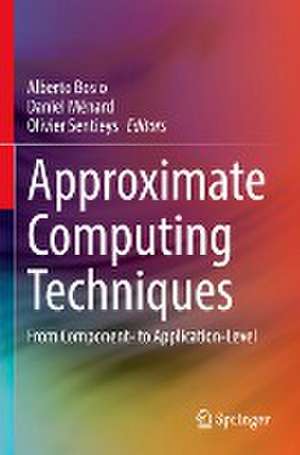Approximate Computing Techniques: From Component- to Application-Level
Editat de Alberto Bosio, Daniel Ménard, Olivier Sentieysen Limba Engleză Paperback – 11 iun 2023
| Toate formatele și edițiile | Preț | Express |
|---|---|---|
| Paperback (1) | 494.54 lei 3-5 săpt. | +32.48 lei 6-12 zile |
| Springer International Publishing – 11 iun 2023 | 494.54 lei 3-5 săpt. | +32.48 lei 6-12 zile |
| Hardback (1) | 745.15 lei 6-8 săpt. | |
| Springer International Publishing – 11 iun 2022 | 745.15 lei 6-8 săpt. |
Preț: 494.54 lei
Preț vechi: 595.83 lei
-17% Nou
Puncte Express: 742
Preț estimativ în valută:
94.63€ • 99.00$ • 78.61£
94.63€ • 99.00$ • 78.61£
Carte disponibilă
Livrare economică 13-27 martie
Livrare express 26 februarie-04 martie pentru 42.47 lei
Preluare comenzi: 021 569.72.76
Specificații
ISBN-13: 9783030947071
ISBN-10: 3030947076
Pagini: 531
Ilustrații: XXI, 531 p. 167 illus., 123 illus. in color.
Dimensiuni: 155 x 235 x 34 mm
Greutate: 0.77 kg
Ediția:1st ed. 2022
Editura: Springer International Publishing
Colecția Springer
Locul publicării:Cham, Switzerland
ISBN-10: 3030947076
Pagini: 531
Ilustrații: XXI, 531 p. 167 illus., 123 illus. in color.
Dimensiuni: 155 x 235 x 34 mm
Greutate: 0.77 kg
Ediția:1st ed. 2022
Editura: Springer International Publishing
Colecția Springer
Locul publicării:Cham, Switzerland
Cuprins
General introduction Motivations.- Number representations.- Data level approximation.- Dynamic precision scaling.- Hardware level approximation.- Inexact operators.- Computation level approximation - algorithmic level.- Analysis of approximation effect on application quality.- Techniques for finite precision arithmetic.- Compilers and Programming Languages for Approximate Computing.- Design space exploration.- Word-length optimization for fixed-point and floating-point.- HLS of approximate accelerators.- Approximate Computing for IoT Applications.- Approximating Safety-Critical Applications.- Approximate Computing for HPC Applications.
Notă biografică
Alberto Bosio received his PhD in Computer Engineering from the Politecnico di Torino, Italy in 2006. From 2007 to 2018 was an Associate Professor at LIRMM - University of Montpellier in France. He is now a Full Professor at the INL - Ecole Centrale de Lyon - Institute of Nanotechnology (France). His research interests include Approximate Computing, In-Memory Computing, Test and Diagnosis of Digital circuits and systems and Reliability. He co-authored 3 books and 4 book-chapter, 4 patents, 46 papers in international journals and more than 152 papers in international conferences and workshops book, 3 patents, 35 journals, and over 120 conference papers. He will be is the chair of the European Test Technology Technical Council - IEEE eTTTCETTTC from January 2018 and . He is a member of the IEEE.
Daniel Menard received the Ph.D. and HDR degrees in Signal Processing and Telecommunications from the University of Rennes, respectively in 2002 and 2011. From 2003 to 2012he was Associate Professor at the University of Rennes in France. He is currently Full Professor at INSA Rennes. His research activities focus on the energy efficient implementation of signal and image processing applications in embedded systems. His research topics include approximate computing, accuracy evaluation, fixed-point arithmetic, energy optimization in MPSoC and low power HEVC video encoding and decoding. He has published more than 100 papers in international journals and in international conferences. He is a member of the ASPS Technical Committee of the IEEE Signal Processing Society.
Olivier Sentieys is a Professor at the University of Rennes and holds an Inria Research Chair on Energy-Efficient Computing Systems. He is leading the Taran team common to Inria (French research institute dedicated to computational sciences) and IRISA Laboratory. His research interests are in the area of computer architectures, embedded systems and signal processing, with a focus on system-level design, energy-efficiency, reconfigurable systems, hardware acceleration, approximate computing, fault tolerance, and power management of energy-harvesting sensor networks. He authored or co-authored more than 250 journal or conference papers, holds 6 patents, and served in the technical committees of several international IEEE/ACM/IFIP conferences.
Daniel Menard received the Ph.D. and HDR degrees in Signal Processing and Telecommunications from the University of Rennes, respectively in 2002 and 2011. From 2003 to 2012he was Associate Professor at the University of Rennes in France. He is currently Full Professor at INSA Rennes. His research activities focus on the energy efficient implementation of signal and image processing applications in embedded systems. His research topics include approximate computing, accuracy evaluation, fixed-point arithmetic, energy optimization in MPSoC and low power HEVC video encoding and decoding. He has published more than 100 papers in international journals and in international conferences. He is a member of the ASPS Technical Committee of the IEEE Signal Processing Society.
Olivier Sentieys is a Professor at the University of Rennes and holds an Inria Research Chair on Energy-Efficient Computing Systems. He is leading the Taran team common to Inria (French research institute dedicated to computational sciences) and IRISA Laboratory. His research interests are in the area of computer architectures, embedded systems and signal processing, with a focus on system-level design, energy-efficiency, reconfigurable systems, hardware acceleration, approximate computing, fault tolerance, and power management of energy-harvesting sensor networks. He authored or co-authored more than 250 journal or conference papers, holds 6 patents, and served in the technical committees of several international IEEE/ACM/IFIP conferences.
Textul de pe ultima copertă
This book serves as a single-source reference to the latest advances in Approximate Computing (AxC), a promising technique for increasing performance or reducing the cost and power consumption of a computing system. The authors discuss the different AxC design and validation techniques, and their integration. They also describe real AxC applications, spanning from mobile to high performance computing and also safety-critical applications.
- Provides a single-source reference to the state-of-the art of approximate computing (AxC);
- Presents a global picture of the approximate computing paradigm, at various levels of abstraction;
- Discusses real AxC applications, such as Approximate Computing for IoT, high performance computing and safety-critical applications.
Caracteristici
Provides a single-source reference to the state-of-the art of approximate computing (AxC) Presents a global picture of the approximate computing paradigm, at various levels of abstraction Discusses real AxC applications, such as Approximate Computing for IoT,
